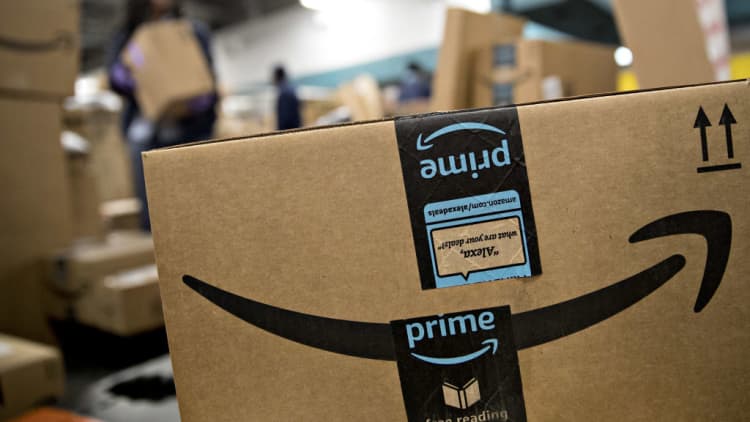When Amazon CEO Jeff Bezos tweeted a picture of himself with singer and rapper Lizzo at the Super Bowl in Miami, saying he was "100% Lizzo's biggest fan," the response from the Twitter-sphere was more about his 1% status: Pay taxes, Twitter users said.
But for the first time since 2016, Amazon's critics won't be able to point to the tech giant's nonexistent federal tax bill.
That's because Amazon actually owed money to the federal government in 2019. After two straight years of paying $0 in U.S. federal income tax, Amazon was on the hook for a $162 million bill in 2019, the company said in an SEC filing on Thursday.
Of course, $162 million is still just a fraction of the $13.9 billion in pre-tax income Amazon reported for 2019 — roughly 1.2%, in fact. The federal corporate tax rate is 21%, but as in the past, Amazon likely employed various tax credits and deductions to reduce its federal tax bill. Amazon also reported $280.5 billion in total revenue in 2019.
Amazon has been the subject of much criticism over the fact that the company's final federal tax burden has been particularly lacking in recent years. The company also came under fire for seeking huge tax incentives worth billions of dollars as part of its search for a second headquarters, or "HQ2," in 2018.
In 2018, Amazon posted income of more than $11 billion, but the company paid $0 in federal taxes. In fact, thanks to tax credits and deductions, Amazon actually received a federal tax refund of $129 million. That was a year after Amazon received a $137 million refund from the federal government for 2017.
President Donald Trump is a frequent critic of Amazon for paying "little or no taxes to state and local governments," though the Trump Administration's 2017 Tax Cuts and Jobs Act helped to lower the statutory corporate tax rate.
In February 2019, Senator Bernie Sanders pointed out in a tweet that any one of the company's roughly 150 million Amazon Prime members would have paid more for that program's annual fee ($119) than Amazon paid in federal taxes for 2018 or 2017.
In a blog post on Thursday, Amazon touted the fact that the company had "over $1 billion in federal income tax expense" in 2019. However, that total includes the $162 million federal tax bill, as well as another $914 million federal tax bill that the company says has been deferred until a later date. (Federal tax laws companies to delay tax payments on certain income, including some foreign earnings and long-term investments in items such as equipment or machinery.)
Amazon also reported $276 million in state tax payments in 2019, as well as an international tax bill of more than $1.1 billion, according to Thursday's SEC filing. And, the company notes in its blog post that Amazon also paid roughly $2.4 billion "in payroll taxes and customs duties" in 2019.
However, paying something like payroll tax is hardly something to boast about, according to Matthew Gardner, a senior fellow at the Institute on Taxation and Economic Policy, or ITEP, a nonpartisan and nonprofit tax policy think tank. In a blog post responding to Amazon's release of its 2019 tax bill, Gardner notes that "economists agree that payroll taxes are ultimately paid by employees in the form of reduced compensation."

Gardner also argues that, despite Amazon reporting its first positive federal income tax bill since 2016, the company was still on the hook for a small fraction of the corporate tax rate in 2019. "The clear fact remains that the federal income tax system still can hardly lay a glove on one of the biggest and most profitable corporations in the world," Gardner writes in his blog post.
When reached for comment by CNBC Make It, an Amazon spokesperson declined to comment on the company's 2019 tax bill beyond what is in the company's recent blog post. "We follow all applicable federal and state tax laws, and our U.S. taxes are a reflection of our continued investments, compensation of our employees, and the current tax rules," the company writes in that post.
Amazon CEO Jeff Bezos and his massive wealth — he's the world's richest person with an estimated net worth of $124 billion, according to Bloomberg — has also become a talking point for Democratic presidential candidates like Sanders and Elizabeth Warren who advocate for some form of wealth tax. While Bezos has not disclosed his personal tax bill, the billionaire would pay roughly $6 billion a year under Warren's proposed wealth tax, and $9 billion under Sanders' proposal.
Don't Miss:
Amazon paid $0 in federal taxes in 2018 — and it's partially thanks to Trump
Like this story? Subscribe to CNBC Make It on YouTube!


